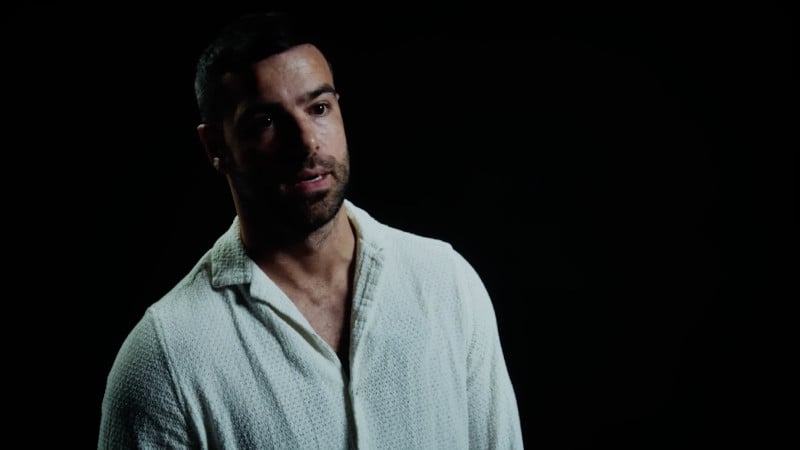
Amsterdam premieres exclusively in theaters Oct. 7.
There’s a very good movie simmering inside Amsterdam that might have flourished if writer/director David O. Russell had the discipline to keep a tight rein on the overly ambitious scale of his script. A period piece/dramedy/mystery/thriller/romance/satire, Amsterdam reminded me of listening to a 6-year-old trying to tell you a story that just rambles off into a ditch because of their unfettered hyper indulgence with convoluted asides. What starts out as a relatively compact and clever tale of two WWI veterans who get framed for murder devolves into a hodgepodge of connected tangents that includes everything from a triangular soulmate relationship to the surreptitious rise of facism in the United States between WWI and WWII.
Burt (Christian Bale) narrates the overall story, and the context of his life as a WWI veteran who lost his eye in battle. Nowadays, he either works tirelessly or sees his best friend Harold Woodman (John David Washington), a lawyer in an all-Black firm. Russell takes us on a lengthy flashback to show us how the two met in France, 1918, when they were assigned to the same platoon. Riddled with shrapnel and major wounds, they’re patched up by Valerie Brandenburg (Margot Robbie), an American expat volunteer nurse in France, and the trio become inseparable, relocating to Amsterdam. Their idyllic existence ends, however, when Burt goes back home to his apathetic wife, Beatrice, (Andrea Riseborough). Valerie and Harold realize their romantic relationship can’t survive in America, Val vanishes, and Harold follows Burt to New York to get his law degree.
In 1933, Harold and Burt are summoned in secret by Liz Meekins (Taylor Swift), the daughter of their former non-racist commander, General Bill Meekins (Ed Begley Jr.), to perform an autopsy on his recently deceased body, as she fears foul play. Burt performs the procedure with the help of mortician’s assistant Irma St. Clair (Zoe Saldana) and just as they go to reveal the results, Liz is brutally run over by a car driven by a scarred man (Timothy Olyphant), who then convinces the crowd that Harold and Burt pushed her. They go on the run and all hell breaks loose.
That’s a lot to process but there’s at least five other subplots not even mentioned. If Russell kept the story entirely focused on the trio of Valerie, Burt, and Howard, the movie would have been much lighter on its feet because of the rapport and comedic performances of Robbie, Bale, and Washington. They’re great together, and their halcyon remembrances of Amsterdam as their happiest and purest days of love and friendship are the most affecting of the film. They sizzle whenever they share the screen, as Bale’s manic energy, Washington’s dry wit, and Robbie’s wide-eyed idealism work in perfect synergy.
And while they’re supported by some interesting performances by the likes of Saldana, Mike Myers, Michael Shannon, and Chris Rock, most of the cast are operating within an impenetrable sliding scale of their personalities being “way too big” or “way too quirky.” There’s scenery chewing galore, especially as the machinations of the overarching plot reach their climax and there’s no shortage of scenes featuring arch fascists, corporatists, or moralists banging literal and figurative podiums. By the last 30 minutes, what should have been a lark-filled mystery unveiling instead becomes a pretty insufferable, verbose, on-the-nose conclusion that draws parallels to what happened then with today’s political discourse. How the movie went from a charming war friends pastiche to an ending that has Robert De Niro’s General character reading a speech next to actual footage of his real-life counterpart in history doing the same is exactly what’s wrong with Amsterdam. Russell just veers indiscriminately towards whatever he’s trying to say and hammers it home without any of the grace present in the first reel.
It’s like a Coen brothers feature procreated with a Wes Anderson movie and out popped Amsterdam’s aesthetics.
Strongest performances aside, Amsterdam is also an unequivocally beautiful film to look at. It’s like a Coen brothers feature procreated with a Wes Anderson movie and out popped Amsterdam’s aesthetics. Cinematographer Emmanuel Lubezki, production designer Judy Becker, and the costume and hair and makeup teams have recreated the time and places with incredible texture and gorgeous color palettes. Robbie and Anya Taylor-Joy are luminous. The men look dapper even if most are sporting some kind of post-war prosthetic scar or deformity. But in the end, none of the wrapping can save the film from the self-important nosedive it takes, which sadly sucks the life out of all of the early material that had such promise.






